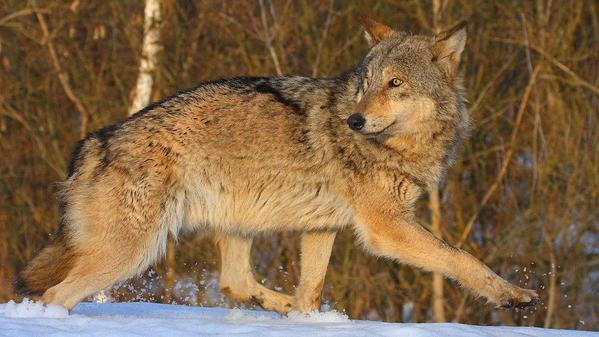With people removed, wildlife thriving in Chernobyl


A free daily email with the biggest news stories of the day – and the best features from TheWeek.com
You are now subscribed
Your newsletter sign-up was successful
Animals like elk, wild boar, red deer, and roe deer are flourishing in an unlikely place — Chernobyl.
It has been nearly 30 years since the 1986 Soviet nuclear disaster in Ukraine, and scientists wrote in a study published Monday in the journal Current Biology that radiation contamination is not keeping wildlife from thriving in the 1,600-square-mile Chernobyl Exclusion Zone, where people cannot live. "When humans are removed, nature flourishes — even in the wake of the world's worst nuclear accident," said Jim Smith, a specialist in earth and environmental sciences at Britain's University of Portsmouth. "It's very likely that wildlife numbers at Chernobyl are now much higher than they were before the accident."
Earlier studies conducted in the zone showed major radiation effects and a decrease in wildlife populations, Reuters reports, but Smith and his fellow researchers found that now, the population rates of elk, roe deer, red deer, and wild boar were close to those in four uncontaminated nature reserves in the area. The team also discovered that the number of wolves living in and around the site is more than seven times greater than in similar nature reserves. "These unique data showing a wide range of animals thriving within miles of a major nuclear accident illustrate the resilience of wildlife populations when freed from the pressures of human habitation," said study co-leader Jim Beasley of the University of Georgia. The researchers said looking at Chernobyl might provide insight into the long-term impact on wildlife following the Fukushima nuclear accident in Japan.
The Week
Escape your echo chamber. Get the facts behind the news, plus analysis from multiple perspectives.

Sign up for The Week's Free Newsletters
From our morning news briefing to a weekly Good News Newsletter, get the best of The Week delivered directly to your inbox.
From our morning news briefing to a weekly Good News Newsletter, get the best of The Week delivered directly to your inbox.
A free daily email with the biggest news stories of the day – and the best features from TheWeek.com
Catherine Garcia has worked as a senior writer at The Week since 2014. Her writing and reporting have appeared in Entertainment Weekly, The New York Times, Wirecutter, NBC News and "The Book of Jezebel," among others. She's a graduate of the University of Redlands and the Columbia University Graduate School of Journalism.
-
 History-making moments of Super Bowl halftime shows past
History-making moments of Super Bowl halftime shows pastin depth From Prince to Gloria Estefan, the shows have been filled with memorable events
-
 The Washington Post is reshaping its newsroom by laying off hundreds
The Washington Post is reshaping its newsroom by laying off hundredsIn the Spotlight More than 300 journalists were reportedly let go
-
 Quiet divorces are sneaking up on older couples
Quiet divorces are sneaking up on older couplesThe explainer Checking out; not blowing up
-
 Nobody seems surprised Wagner's Prigozhin died under suspicious circumstances
Nobody seems surprised Wagner's Prigozhin died under suspicious circumstancesSpeed Read
-
 Western mountain climbers allegedly left Pakistani porter to die on K2
Western mountain climbers allegedly left Pakistani porter to die on K2Speed Read
-
 'Circular saw blades' divide controversial Rio Grande buoys installed by Texas governor
'Circular saw blades' divide controversial Rio Grande buoys installed by Texas governorSpeed Read
-
 Los Angeles city workers stage 1-day walkout over labor conditions
Los Angeles city workers stage 1-day walkout over labor conditionsSpeed Read
-
 Mega Millions jackpot climbs to an estimated $1.55 billion
Mega Millions jackpot climbs to an estimated $1.55 billionSpeed Read
-
 Bangladesh dealing with worst dengue fever outbreak on record
Bangladesh dealing with worst dengue fever outbreak on recordSpeed Read
-
 Glacial outburst flooding in Juneau destroys homes
Glacial outburst flooding in Juneau destroys homesSpeed Read
-
 Scotland seeking 'monster hunters' to search for fabled Loch Ness creature
Scotland seeking 'monster hunters' to search for fabled Loch Ness creatureSpeed Read
